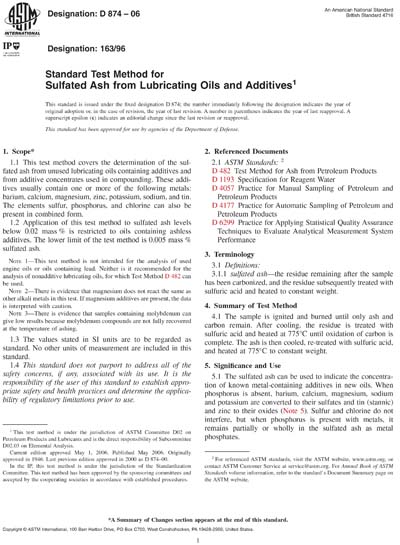Historical
ASTM D874-06
Standard Test Method for Sulfated Ash from Lubricating Oils and Additives
DESIG: D874 06 ^TITLE: Standard Test Method for Sulfated Ash from Lubricating Oils and Additives ^SCOPE:
1. Scope
1.1 This test method covers the determination of the sulfated ash from unused lubricating oils containing additives and from additive concentrates used in compounding. These additives usually contain one or more of the following metals: barium, calcium, magnesium, zinc, potassium, sodium, and tin. The elements sulfur, phosphorus, and chlorine can also be present in combined form.
1.2 Application of this test method to sulfated ash levels below 0.02 mass % is restricted to oils containing ashless additives. The lower limit of the test method is 0.005 mass % sulfated ash. This test method is not intended for the analysis of used engine oils or oils containing lead. Neither is it recommended for the analysis of nonadditive lubricating oils, for which Test Method D 482 can be used.
Note 1There is evidence that magnesium does not react the same as other alkali metals in this test. If magnesium additives are present, the data is interpreted with caution.
Note 2There is evidence that samples containing molybdenum can give low results because molybdenum compounds are not fully recovered at the temperature of ashing.
1.3 &solely-SI-units;
This standard does not purport to address all of the safety concerns, if any, associated with its use. It is the responsibility of the user of this standard to establish appropriate safety and health practices and determine the applicability of regulatory limitations prior to use.
ASTM International [astm]

